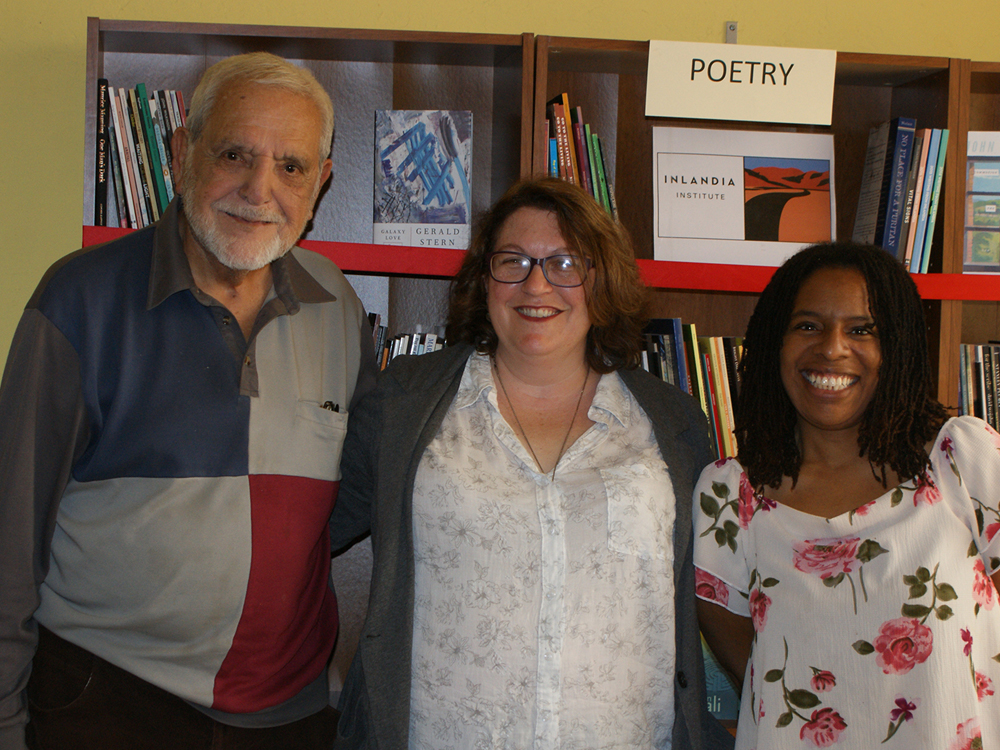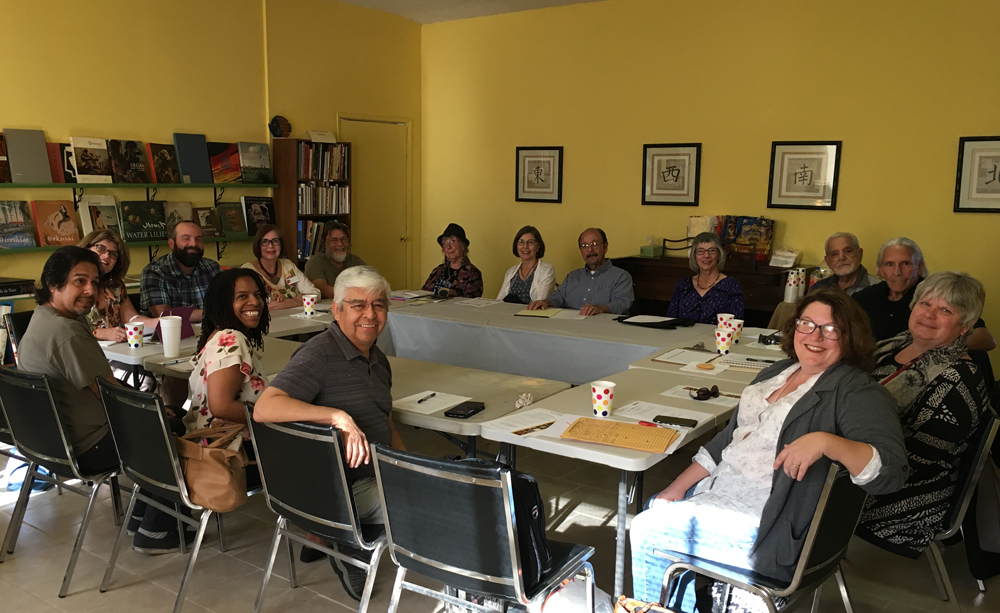Disabled Writers on Publishing, How Libraries are Dealing With #MeToo, and More
Rumaan Alam on writing about race and gender; Lorrie Moore’s politics; the history of young adult literature; and other news.
Jump to navigation Skip to content
Rumaan Alam on writing about race and gender; Lorrie Moore’s politics; the history of young adult literature; and other news.
Writers on bookstores worth traveling for; National Book Awards moves to include noncitizens; poet Carl Phillips on revision; and other news.
“I wanted to learn how to write English and learn how to tell a story so I could communicate the experiences that I did not see in history books....” Clemantine Wamariya talks about storytelling and her debut memoir, The Girl Who Smiled Beads: A Story of War and What Comes After (Crown, 2018), which she cowrote with Elizabeth Weil.
Jane Chu, chair of the National Endowment for the Arts, will step down in June; tomorrow is Free Comic Book Day; tips on applying for grants; and other news.
Temperatures in the thirties, driving rain, and headwinds gusting at thirty miles per hour are not ideal weather conditions for a marathon. And yet, approximately thirty thousand people participated in this year’s Boston Marathon slogging through these treacherous conditions. In Matthew Futterman’s essay “What It Was Like to Run the Boston Marathon in a Freezing Deluge” in the New York Times, he writes about the glory of getting to tell the story of this miserable yet epic experience. Write a personal essay about an event from your past in which circumstances beyond your control transformed what would have been a more standard situation into something decidedly more dramatic.
For years, Poets & Writers’ Readings & Workshops program has been conducting Literary Roundtable Meetings in California and New York State. The meetings bring together people from all areas of the literary community to share ideas, news, and resources. In California, eight community meetings are held a year. This spring, a meeting was held in California’s Inland Empire region, an area centered around the cities of Riverside and San Bernardino. The guest speaker was Dr. Ernie Garcia of the Garcia Center for the Arts, where the meeting was held, and the cohost was Cati Porter, director of the Inlandia Institute. Porter is a poet, editor, essayist, and arts administrator, and her third poetry collection, The Body at a Loss, is forthcoming next year from CavanKerry Press. She writes about the value of the annual Literary Roundtable Meetings and the recent gathering in San Bernardino, California.
 For the past decade, Inlandia Institute has been the Inland Empire regional partner for Poets & Writers’ annual Inland Empire Literary Roundtable Meeting. We have always held the meeting at a local library, but this year thought it would be fun to mix it up and meet at the Garcia Center for the Arts in San Bernardino.
For the past decade, Inlandia Institute has been the Inland Empire regional partner for Poets & Writers’ annual Inland Empire Literary Roundtable Meeting. We have always held the meeting at a local library, but this year thought it would be fun to mix it up and meet at the Garcia Center for the Arts in San Bernardino.
Situated in an urban center, the Garcia Center is an oasis. Opening the front gate is like stepping through a portal: The courtyard is filled with desert-loving flora. Banana trees, heavy with fruit, bend over the walkways. A fountain purrs. The building is a Spanish adobe, once abandoned and now rehabilitated, and home to artist studios and arts organizations, including a second office for Inlandia.
The Garcia Center is named after and run by Dr. Ernie Garcia, our guest speaker for the roundtable that day. I arrive early and can already hear voices as I make my way toward the community library for the meeting. That’s when I find Ernie sitting on a bench in the courtyard with another early arrival. The three of us head into the “library,” a large room stocked, thanks to generous community donations, with books and comfy chairs.
An island of tables has already been set up for our meeting. Soon Jamie Asaye FitzGerald, director of Poets & Writers’ Readings & Workshops (West), arrives—and then about a dozen others. Just inside the door is an upright piano, another donation, and Jamie sits and plays for us as we settle in. The table fills up quickly.
We have just begun going around the room introducing ourselves when two more people walk in, then one more, then a couple more again, until nearly every seat is filled including the wing chairs and sofa. Among those present are Timothy Green of Rattle literary magazine, Richard Soos of Cholla Needles Press, Jennifer Kane of Arts Connection, Juan Delgado of California State University in San Bernardino, Cindy Rinne of the San Bernardino Valley Concert Association, Edward Ferrari of PoetrIE, and Nikia Chaney, the Inlandia Literary Laureate.
In all, twenty-five people coming from as far and wide as Sun City, Rancho Cucamonga, Barstow, Ontario, Wrightwood, Forest Falls, Joshua Tree, Yucaipa, Moreno Valley, Redlands, and Riverside. There is such thirst for this kind of support for artists and writers in Inlandia that folks were willing to drive great distances just to connect.
Dr. Garcia—aka Ernie, aka Neto Esquelito—gives us an oral history of the Garcia Center, and then reads from his book, Growing Up Aleluya, about religious intolerance in the barrio of South Colton, California.
When Ernie finishes, I pull out a pair of scissors.
Ernie, Nikia, and I push back our chairs and walk to a trio of bookshelves behind me, a red ribbon draped across. Ernie cuts the ribbon. The sign beneath reads: Inlandia Poetry Library Donated By Inlandia Literary Laureate Nikia Chaney.
Nikia found herself with more books than bookshelves after serving as a judge for this year’s Kate and Kingsley Tufts Poetry Prize, so she decided to donate them as part of her laureateship to form the Inlandia Poetry Library at the Garcia Center. More than four hundred poetry books are now free to the public to check out, on the honor system, when the center is open.
Writing is about connecting. It’s not, as they say, always a solitary act. Community is the well we drink from after the long journey inward. What Poets & Writers does is create someplace for us to come back to—for exchange of ideas and connection with other writers—something that, in the Inlandia region, is hard to come by.

Support for this event and Readings & Workshops in California is provided by the California Arts Council, a state agency, and the National Endowment for the Arts, a federal agency. Additional support comes from the Friends of Poets & Writers.
Photos: (top) Dr. Ernie Garcia, Cati Porter, and Nikia Chaney (Credit: Cindy Rinne). (bottom) Inland Empire group (Credit: Jamie FitzGerald).Jon Parrish Peede confirmed as chairman of the National Endowment for the Humanities; how Melissa Broder wrote her debut novel; a short film on writer’s block; and other news.
Prose writers, if you have a short story, essay, novel, or book of nonfiction ready to submit, consider the following contests with deadlines of April 30 and May 1, each offering a prize of at least $1,000 and publication.
Red Hen Press Nonfiction Award: A prize of $1,000 and publication by Red Hen Press is given annually for an essay collection, memoir, or book of narrative nonfiction. Florencia Ramirez will judge. Entry fee: $25. Deadline: April 30
Winning Writers Tom Howard/John H. Reid Fiction and Essay Contest: Two prizes of $2,000 each and publication on the Winning Writers website are given annually for a short story and an essay. Dennis Norris II will judge. Entry fee: $20. Deadline: April 30
Nimrod International Journal Literary Award: A prize of $2,000 and publication in Nimrod International Journal is given annually for a work of short fiction. A runner-up prize of $1,000 and publication is also given. The winner and runner-up also receive transportation and lodging to attend an awards ceremony and writing conference in Tulsa in October. Entry fee: $20. Deadline: April 30
Glimmer Train Press Fiction Open: A prize of $3,000, publication in Glimmer Train Stories, and 10 copies of the prize issue is given twice yearly for a short story. A $1,000 second-place prize is also given. The editors will judge. Entry fee: $21. Deadline: April 30
Glimmer Train Press Very Short Fiction Award: A prize of $2,000, publication in Glimmer Train Stories, and 10 copies of the prize issue is given three times a year for a very short story. Entry fee: $16. Deadline: April 30
Southwest Review David Nathan Meyerson Fiction Prize: A prize of $1,000 and publication in Southwest Review is given annually for a short story by a writer who has not published a full-length book of fiction. Entry fee: $25. Deadline: May 1
Leapfrog Press Fiction Award: A prize of $1,150 and publication by Leapfrog Press is given annually for a short story collection, a novel, or a novella. Marie-Helene Bertino and the Leapfrog editors will judge. Entry fee: $33. Deadline: May 1
Whiting Foundation Creative Nonfiction Grants: Up to six grants of $40,000 each are given annually for creative nonfiction works-in-progress to enable writers to complete their books. Creative nonfiction writers under contract with a publisher and at least two years into their contract are eligible. There is no entry fee. Deadline: May 1
Visit the contest websites for complete guidelines, and check out the Grants & Awards database and Submission Calendar for more contests in poetry, fiction, and creative nonfiction.
Hobbies and activities often inspire and become an important part of a writer’s life. In his memoir What I Talk About When I Talk About Running (Knopf, 2008), Haruki Murakami recounts his personal history with running, and draws parallels between his passions for marathons and novels. More recently, in her essay collection, The Curse of the Boyfriend Sweater (Flatiron Books, 2018), Alanna Okun explores her practices of knitting and crafting, and how they interact with her writing life and overall well-being. This week, try writing an essay about an interest of your own that runs parallel to, or perhaps even informs, your identity as a writer.
Big Blue Marble Bookstore is an independently owned bookstore located in the Mt. Airy section of Philadelphia that specializes in progressive and multicultural titles of interest to Philadelphians in general and Mt. Airy-ites in particular: children’s books; woman-centered pregnancy and parenting; sustainable living; queer, African-American, and Jewish studies; feminist science fiction; literary graphic novels; and more. They host readings, events, book clubs, and other groups throughout the year.
